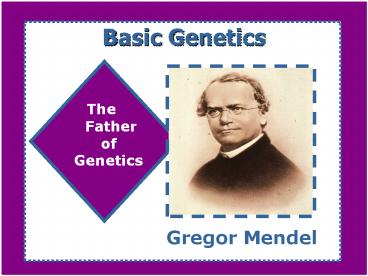Basic Genetics - PowerPoint PPT Presentation
1 / 39
Title:
Basic Genetics
Description:
Basic Genetics The Father of Genetics Gregor Mendel Objectives: To distinguish between heredity and inheritance To define pollination To identify the major parts of a ... – PowerPoint PPT presentation
Number of Views:360
Avg rating:3.0/5.0
Title: Basic Genetics
1
Basic Genetics
The Father of Genetics
Gregor Mendel
2
Gregor Mendel
3
Objectives
- To distinguish between heredity and inheritance
- To define pollination
- To identify the major parts of a flowering plant
- To describe Mendels experiments in heredity
4
Heredity transmission of traits from parents to
their offspring
Inheritance passing of traits by heredity
5
Mendels experiments used pea plants
6
Pollination transfer of pollen from anthers to
stigma in flowers
- 1) self pollination occurs within the same
flower or same plant - 2) cross pollination occurs between different
plants
7
Receptical
8
(No Transcript)
9
Mendels Crosses with Pea Plants
X
Pure tall plants
Pure short plants
parental generation
P1
Cross Pollination
All Tall plants
first filial generation
F1
Self Pollination
second filial generation
787 tall plants, 277 short plants
F2
3 to 1 ratio
10
(No Transcript)
11
Objective
- To describe Mendels 3 principles of inheritance
12
1) Principle of Dominance and Recessiveness
- Each trait is controlled by 2 factors, one factor
(dominant ) may mask the other factor (recessive
) preventing it from having an effect.
F1
F2
P1
13
2) Principle of Segregation
- The two factors for a characteristic separate
during the formation of eggs and sperm.
14
3) Principle of Independent Assortment
- Factors for different characteristics are
distributed to reproductive cells independently.
15
Objectives
- To define gene
- To define allele
16
Gene segment of DNA on a chromosome that
codes for a particular protein
- genes occur in pairs
17
Allele alternative form of a gene
Dominant capital letter
T tall
t short
G green pods
g yellow pods
Recessive Lowercase letter
18
Objectives
- To define genotype and phenotype
- To distinguish between homozygous and
heterozygous - To define multiple alleles
19
Genotype genetic makeup of an
organism (genes)
(internal information)
20
Phenotype physical characteristics of an
organism
(external appearance)
21
What does Phenotypes come form
22
Example of Genotype and Phenotype
Tall
TT
genotype
phenotype
23
Homozygous when both alleles
of a pair are the
same
homozygous dominant
TT
homozygous recessive
tt
24
Heterozygous when both alleles
of a pair are not
the same
heterozygous (tall)
Tt
25
Multiple alleles 3 or more alleles
that control a trait
- Example blood type (IA,IB,io)
GENOTYPES IAIA IAio RESULTING PHENOTYPES Type A Type A
IBIB IBio Type B Type B
IAIB Type AB
ioio Type O
26
Objectives
- To define probability
- To predict the results of monohybrid crosses by
using a Punnett square
27
Probability likelihood that a particular event
will occur
number of times a particular event occurs
Probability
number of opportunities for the event to occur
28
Example 1 Flipping a Coin
½
Chances of coming up heads
29
Example 2 Rolling Dice
1
1
1
x
6
36
6
probability of rolling a six on 1 dice
probability of rolling a six on 2 dice
probability of rolling a six on 1 dice
30
monohybrid cross
31
Objectives
- To define test cross
- To define incomplete dominance
- To define codominance
32
Test cross an individual with unknown genotype
is crossed with a homozygous recessive
individual
- used to determine the genotype of any individual
whose phenotype is dominant
33
In rabbits, black fur color is dominant over
brown fur color
B black fur
b brown fur
bb
BB
or
Bb
34
Incomplete Dominance
- when 2 or more alleles influence the phenotype
- results in a trait intermediate between the
dominant and recessive traits
35
Incomplete Dominance
36
Codominance condition in which both alleles of
a gene are expressed
- example roan coat in horses
- white hair (HW) is codominant with red hair (HR)
- horses with genotype (HRHW) have coats with a
mixture of red and white hairs (roan)
37
Roan Coat
38
Objectives
- To predict the results of dihybrid crosses by
using a Punnett square
39
dihybrid cross cross between individuals that
involves two pair of contrasting traits































